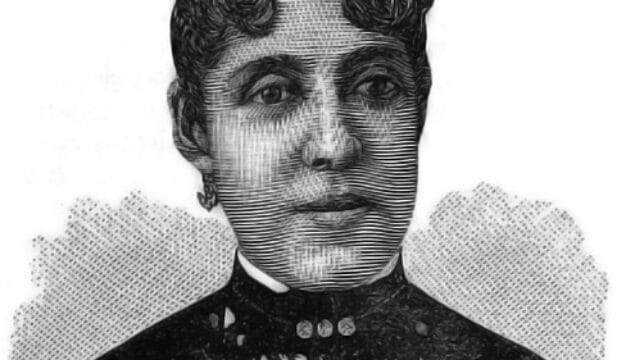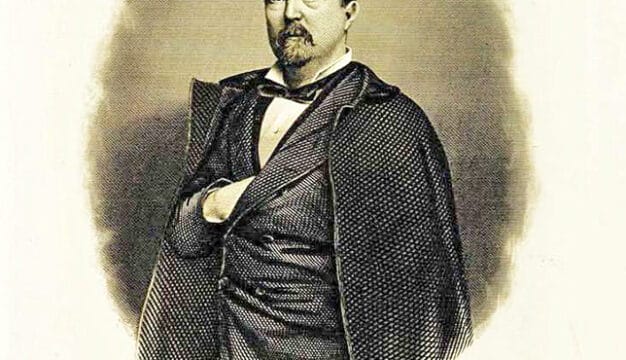U. W. Clemon
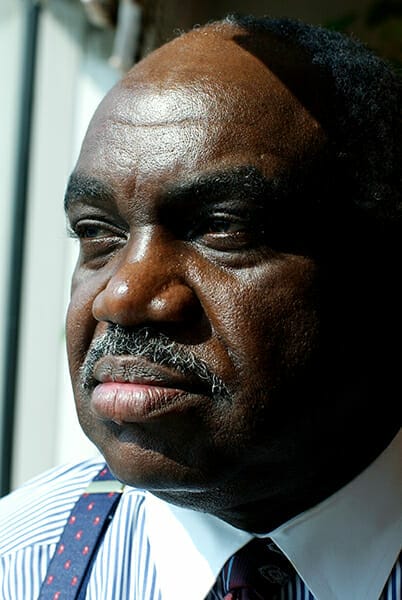 U. W. Clemon
U. W. Clemon (1943- ), Alabama’s first Black federal judge, also served as chief judge of the United States District Court for the Northern District of Alabama. Long before his notable career on the federal bench, however, Clemon had distinguished himself as a student, a civil rights activist, a lawyer, a state senator, and a civic and church leader.
U. W. Clemon
U. W. Clemon (1943- ), Alabama’s first Black federal judge, also served as chief judge of the United States District Court for the Northern District of Alabama. Long before his notable career on the federal bench, however, Clemon had distinguished himself as a student, a civil rights activist, a lawyer, a state senator, and a civic and church leader.
Clemon is one of nine children of Mississippi sharecroppers. His parents Mose and Addie Clemon moved to Fairfield, in Jefferson County, two years before Clemon’s birth on April 9, 1943, seeking better opportunities for their family in the growing steel industries in and around Birmingham. Typical of the Jim Crow South, Clemon’s formal education began in a frame building with no indoor plumbing, library, or playground equipment, less than three blocks from a new, state-of-the-art elementary school for Whites. Despite segregation, Clemon was an outstanding student whose love of learning was encouraged by his parents and nurtured by his teachers. Clemon was president of the student body and editor-in-chief of the school newspaper and valedictorian of the Westfield High School Class of 1961.
Clemon’s decision to become a civil rights lawyer came at age 13, when he witnessed two white police officers threaten a classmate. His commitment to equal rights deepened while attending Birmingham’s Miles College, where he and other student activists boycotted downtown city stores in 1962. Though labeled an “outside agitator” by Public Safety Commissioner Eugene “Bull” Connor, Clemon boldly presented a petition protesting Birmingham’s segregation ordinances to the Birmingham City Commission, before being ordered out of the meeting. When Martin Luther King Jr. launched the Birmingham Campaign in 1963, Clemon was assigned to desegregate the Birmingham Public Library. He was elected president of the student body and graduated as valedictorian of Miles College in 1965.
Clemon then entered Columbia University Law School, because the University of Alabama (UA) law school did not enroll Blacks. Instead, the state of Alabama paid part of the tuition for Black students to study law in other states. Later, Clemon would play a central role in reversing school segregation in Alabama and in securing the rights of Blacks to attend UA and all of its programs. In 1967, he married Barbara Lang, with whom he would have two children. Barbara was a teacher for many years and served on the Jefferson County Board of Education. At Columbia, where many of the professors were closely associated with the civil rights movement, Clemon worked part-time with the local NAACP Legal Defense Fund (LDF) and graduated in 1968. During this time, he and fellow civil rights attorney Oscar W. Adams Jr. represented plaintiffs from the Birmingham-based Committee for Equal Job Opportunity in their discrimination lawsuit against ACIPCO.
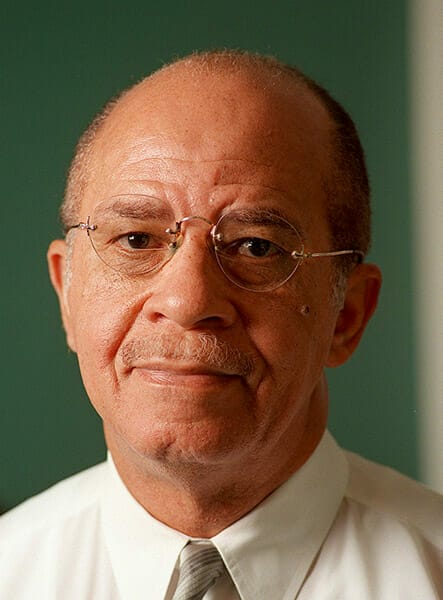 Richard Arrington
After finishing law school, Clemon returned to Birmingham and joined the law firm of Adams, Burg & Baker, which later became Adams, Baker & Clemon. That firm included future Alabama Supreme Court Justice Adams and James K. Baker, the first Black Birmingham City Attorney. The firm was regarded by many as the preeminent civil rights law firm in Alabama; Clemon specialized in school desegregation and employment discrimination cases. He and the firm were involved in most of the discrimination lawsuits brought against the major private and public employers in Alabama in the 1960s and 1970s. He was a principal architect in cases leading to desegregating the public schools in north Alabama. In 1969, on behalf of the UA Black student organization, Clemon brought a lawsuit against UA coach Paul “Bear” Bryant to force him to recruit Black athletes. Later, his representation of police brutality victims led to the establishment of a bi-racial committee to improve relations between the Black community and the police and the election of the city’s first Black mayor, Richard Arrington Jr.
Richard Arrington
After finishing law school, Clemon returned to Birmingham and joined the law firm of Adams, Burg & Baker, which later became Adams, Baker & Clemon. That firm included future Alabama Supreme Court Justice Adams and James K. Baker, the first Black Birmingham City Attorney. The firm was regarded by many as the preeminent civil rights law firm in Alabama; Clemon specialized in school desegregation and employment discrimination cases. He and the firm were involved in most of the discrimination lawsuits brought against the major private and public employers in Alabama in the 1960s and 1970s. He was a principal architect in cases leading to desegregating the public schools in north Alabama. In 1969, on behalf of the UA Black student organization, Clemon brought a lawsuit against UA coach Paul “Bear” Bryant to force him to recruit Black athletes. Later, his representation of police brutality victims led to the establishment of a bi-racial committee to improve relations between the Black community and the police and the election of the city’s first Black mayor, Richard Arrington Jr.
In 1974, Clemon and future state Circuit Court Judge J. Richmond Pearson were the first Blacks elected to the Alabama Senate since Reconstruction. Clemon chaired the Rules Committee and the Judiciary Committee, where he challenged capital punishment, pushed Gov. George Wallace to appoint Blacks to state boards and agencies, and advanced legislation that made Black state universities independent of the all-White State Board of Education. When boards of trustees were created for these schools, Clemon thwarted Wallace’s efforts to appoint White majorities.
In 1977, Clemon helped defeat an effort by conservative lawmakers at the federal level to revamp the Fifth Circuit Court; the bill to do so would have left Mississippi, Alabama, Georgia, and Florida with conservative judges and moved more liberal circuit judges in Louisiana and Texas to a two-state Eleventh Circuit Court. Clemon urged the LDF’s Elaine Jones, Texas congresswoman Barbara Jordan, the NAACP’s Clarence Mitchell, and Aaron Henry of Mississippi to oppose the bill, which was killed in the House of Representatives. Clemon was nominated to the federal bench by Pres. Jimmy Carter in 1980. Despite opposition from southern and Alabama conservatives, he received the unanimous vote of the Senate Judiciary Committee and the full Senate. For nearly three decades, Clemon presided over hundreds of significant federal cases. His decisions in numerous race, gender, disability discrimination, and environmental suits resulted in more than $1 billion in damages paid to plaintiffs. The cases also produced promotions, workplace reforms, environmental clean-up projects, and improved medical care for thousands of plaintiffs. He received national attention for requiring various Alabama counties to construct new jail facilities and improve medical care for inmates.
From 1999 through 2006, Clemon served as Chief Judge of the Northern District of Alabama, which includes 11 district judges, six magistrate judges, and five bankruptcy judges. Working with his fellow judges, Clemon implemented in 2000 a new jury plan that greatly increased minority participation on juries, substantially reduced the distances jurors had to travel, and decreased juror costs. He has also sought to increase diversity in the court’s workforce. He stepped down from the chief judgeship in November 2006 and retired from the bench in January 2009.
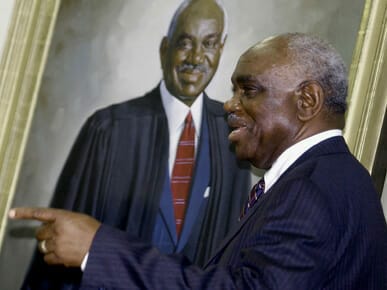 U. W. Clemon
Judge Clemon has received numerous awards and recognitions. These include the Judicial Award of Merit given by the Alabama State Bar, the Johnny Cochran “Soaring Eagle” Award of the American Association of Justice, the Drum Major Award of the Southern Christian Leadership Conference, and the C. Francis Stradford Award of the National Bar Association. He is also the recipient of Columbia University Law School Paul Robeson Award and the Alabama Trial Lawyers Association’s Howell Heflin Award. He has been a panelist on seminars sponsored by the American Bar Association, the National Bar Association, the Alabama State Bar and various other organizations. He holds honorary degrees from Miles College and Birmingham-Southern College; and two Birmingham streets are named in his honor. Judge Clemon is a deacon at Birmingham’s Sixth Avenue Baptist Church, and a member of the Male Chorus.
U. W. Clemon
Judge Clemon has received numerous awards and recognitions. These include the Judicial Award of Merit given by the Alabama State Bar, the Johnny Cochran “Soaring Eagle” Award of the American Association of Justice, the Drum Major Award of the Southern Christian Leadership Conference, and the C. Francis Stradford Award of the National Bar Association. He is also the recipient of Columbia University Law School Paul Robeson Award and the Alabama Trial Lawyers Association’s Howell Heflin Award. He has been a panelist on seminars sponsored by the American Bar Association, the National Bar Association, the Alabama State Bar and various other organizations. He holds honorary degrees from Miles College and Birmingham-Southern College; and two Birmingham streets are named in his honor. Judge Clemon is a deacon at Birmingham’s Sixth Avenue Baptist Church, and a member of the Male Chorus.
Further Reading
- Litwack, Leon F. Trouble in Mind: Black Southerners in the Age of Jim Crow. New York: Knopf, 1998.
- Smith, J. Clay, Jr. Emancipation: The Making of the Black Lawyer 1844-1944. Philadelphia: University of Pennsylvania Press, 1993.


